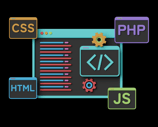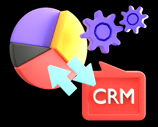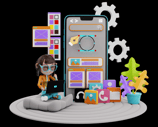Customized Tools
Customized tools refer to software solutions specifically designed to meet the unique needs and challenges of a particular business or individual. Unlike off-the-shelf software, these tools are tailored to streamline operations, solve specific problems, and enhance efficiency. Customized tools can range from simple utilities to complex platforms, depending on the requirements of the organization or user.


Types of Customized Tools
1. Business Process Automation Tools
Definition: Tools designed to automate repetitive tasks and improve workflow efficiency.
Examples: Task management systems, automated invoicing tools, and payroll systems.
Use Cases: Finance, HR, logistics, and customer service.
2. Customer Relationship Management (CRM) Tools
Definition: Custom CRMs tailored to the unique customer interaction processes of a business.
Examples: Sales tracking systems, customer feedback platforms, and support ticket systems.
Use Cases: Retail, healthcare, and IT services.
3. Inventory Management Tools
Definition: Solutions to track, manage, and optimize inventory processes.
Examples: Warehouse management systems and real-time stock tracking tools.
Use Cases: E-commerce, manufacturing, and wholesale.
4. Analytics and Reporting Tools
Definition: Custom tools to analyze data and generate detailed reports for decision-making.
Examples: Sales dashboards, marketing performance trackers, and financial analysis tools.
Use Cases: Marketing agencies, financial institutions, and large enterprises.
5. E-commerce and Point-of-Sale Tools
Definition: Tools to manage online sales or retail transactions.
Examples: Custom shopping carts, payment gateways, and sales tracking systems.
Use Cases: Retail and hospitality industries.
6. Learning Management Systems (LMS)
Definition: Platforms to create, manage, and deliver training content tailored to specific learning objectives.
Examples: Employee training portals, educational platforms, and onboarding tools.
Use Cases: Corporate training, schools, and universities.
7. Integration Tools
Definition: Custom solutions to integrate and sync multiple software applications for unified operations.
Examples: API integration platforms and middleware solutions.
Use Cases: Enterprises with diverse software ecosystems.


Advantages of Customized Tools
Tailored Solutions: Designed to fit specific workflows, reducing inefficiencies and meeting exact requirements.
Enhanced Productivity: Automates repetitive tasks, allowing teams to focus on high-value activities.
Scalability: Grows with the business, adapting to evolving needs and user bases.
Cost Efficiency: Eliminates unnecessary features, focusing only on functionalities that deliver value.
Improved Data Security: Built with industry-specific security standards to protect sensitive information.
Competitive Advantage: Offers unique capabilities that differentiate businesses in the market.
Seamless Integration: Easily integrates with existing systems for cohesive operations.
Real-Time Insights: Provides tailored analytics and reporting for data-driven decisions.
User-Friendly Design: Customizable interfaces ensure ease of use, enhancing user adoption.
Fosters Innovation: Encourages unique approaches to problem-solving and service delivery.








Customized tools are essential in today’s dynamic business environment, offering flexibility and precision that generic software often lacks. By aligning directly with operational goals, these tools help businesses maximize efficiency, reduce costs, and stay competitive. Investing in customized solutions is not just about solving present challenges but also preparing for future growth and innovation.
Contact Us
© 2024. All rights reserved. Nuebiz Media

